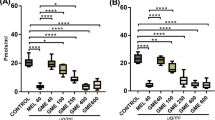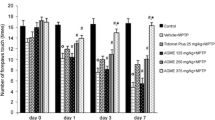Abstract
The 20% ethanol extract of Polygala tenuifolia, Angelica tenuissima, and Dimocarpus longan (WIN-1001X) was derived from a modified version of Korean traditional herbal formula ‘Chungsimyeolda-tang’ which has been used for the treatment of cerebrovascular disorders. The Parkinson’s disease presents with impaired motor functions and loss of dopaminergic neurons. However, the treatment for Parkinson’s disease is not established until now. This study aims to elucidate the therapeutic advantages of WIN-1001X on animal models of Parkinson’s disease. WIN-1001X administration successfully relieved the Parkinsonism symptoms in 1-methyl-4-phenyl-1,2,3,6-tetrahydropyridine (MPTP)-induced Parkinson’s disease mice tested by rota-rod and pole tests. The loss of tyrosine hydroxylase activities in substantia nigra and striatum was also attenuated by administration of WIN-1001X. In mice with sub-chronical MPTP injections, autophagy-related proteins, such as LC3, beclin-1, mTOR, and p62, were measured using the immunoblot assay. The results were favorable to induction of autophagy after the WIN-1001X administration. WIN-1001X treatment on 6-hydroxydopamine-injected rats also exhibited protective effects against striatal neuronal damage and loss of dopaminergic cells. Such protection is expected to be due to the positive regulation of autophagy by administration of WIN-1001X with confirmation both in vivo and in vitro. In addition, an active compound, onjisaponin B was isolated and identified from WIN-1001X. Onjisaponin B also showed significant autophagosome-inducing effect in human neuroblastoma cell line. Our study suggests that relief of Parkinsonism symptoms and rescue of tyrosine hydroxylase activity in dopaminergic neurons are affected by autophagy enhancing effect of WIN-1001X which the onjisaponin B is one of the major components of activity.






Similar content being viewed by others
References
Agid, Y., Javoy, F., & Glowinski, J. (1973). Hyperactivity of remaining dopaminergic neurones after partial destruction of the nigro-striatal dopaminergic system in the rat. Nature New Biology, 245(144), 150–151.
Alam, G., Edler, M., Burchfield, S., & Richardson, J. R. (2017). Single low doses of MPTP decrease tyrosine hydroxylase expression in the absence of overt neuron loss. Neurotoxicology, 60, 99–106. https://doi.org/10.1016/j.neuro.2017.03.008.
Bae, N., Chung, S., Kim, H. J., Cha, J. W., Oh, H., Gu, M. Y., et al. (2015). Neuroprotective effect of modified Chungsimyeolda-tang, a traditional Korean herbal formula, via autophagy induction in models of Parkinson’s disease. Journal of Ethnopharmacology, 159, 93–101. https://doi.org/10.1016/j.jep.2014.11.007.
Cheung, Z. H., & Ip, N. Y. (2009). The emerging role of autophagy in Parkinson’s disease. Molecular Brain, 2, 29. https://doi.org/10.1186/1756-6606-2-29.
Choi, M., Lee, Y., & Cho, S. H. (2018). Angelica tenuissima Nakai ameliorates cognitive impairment and promotes neurogenesis in mouse model of Alzheimer’s disease. Chinese Journal of Integrative Medicine, 24(5), 378–384. https://doi.org/10.1007/s11655-017-2812-2.
Chung, J. W., Choi, R. J., Seo, E. K., Nam, J. W., Dong, M. S., Shin, E. M., et al. (2012). Anti-inflammatory effects of (Z)-ligustilide through suppression of mitogen-activated protein kinases and nuclear factor-kappaB activation pathways. Archives of Pharmacal Research, 35(4), 723–732. https://doi.org/10.1007/s12272-012-0417-z.
Fan, Z., Liang, Z., Yang, H., Pan, Y., Zheng, Y., & Wang, X. (2017). Tenuigenin protects dopaminergic neurons from inflammation via suppressing NLRP3 inflammasome activation in microglia. Journal of Neuroinflammation, 14(1), 256. https://doi.org/10.1186/s12974-017-1036-x.
Guo, C., Shen, J., Meng, Z., Yang, X., & Li, F. (2016). Neuroprotective effects of polygalacic acid on scopolamine-induced memory deficits in mice. Phytomedicine, 23(2), 149–155. https://doi.org/10.1016/j.phymed.2015.12.009.
Iida, M., Miyazaki, I., Tanaka, K., Kabuto, H., Iwata-Ichikawa, E., & Ogawa, N. (1999). Dopamine D2 receptor-mediated antioxidant and neuroprotective effects of ropinirole, a dopamine agonist. Brain Research, 838(1–2), 51–59. https://doi.org/10.1016/s0006-8993(99)01688-1.
Kirik, D., Rosenblad, C., & Bjorklund, A. (1998). Characterization of behavioral and neurodegenerative changes following partial lesions of the nigrostriatal dopamine system induced by intrastriatal 6-hydroxydopamine in the rat. Experimental Neurology, 152(2), 259–277. https://doi.org/10.1006/exnr.1998.6848.
Kopin, I. J. (1987). MPTP: An industrial chemical and contaminant of illicit narcotics stimulates a new era in research on Parkinson’s disease. Environmental Health Perspectives, 75, 45–51.
Kopin, I. J., & Markey, S. P. (1988). MPTP toxicity: Implications for research in Parkinson’s disease. Annual Review of Neuroscience, 11, 81–96. https://doi.org/10.1146/annurev.ne.11.030188.000501.
Kuboyama, T., Hirotsu, K., Arai, T., Yamasaki, H., & Tohda, C. (2017). Polygalae radix extract prevents axonal degeneration and memory deficits in a transgenic mouse model of Alzheimer’s disease. Frontiers in Pharmacology, 8, 805. https://doi.org/10.3389/fphar.2017.00805.
Kunworarath, N., Rangkadilok, N., Suriyo, T., Thiantanawat, A., & Satayavivad, J. (2016). Longan (Dimocarpus longan Lour.) inhibits lipopolysaccharide-stimulated nitric oxide production in macrophages by suppressing NF-kappaB and AP-1 signaling pathways. Journal of Ethnopharmacology, 179, 156–161. https://doi.org/10.1016/j.jep.2015.12.044.
Lee, D. S., Choi, J., Kim, S. H., & Kim, S. (2014). Ameliorating effects of HX106N, a water-soluble botanical formulation, on Abeta25-35-induced memory impairment and oxidative stress in mice. Biological &/and Pharmaceutical Bulletin, 37(6), 954–960.
Li, G., Yu, J., Zhang, L., Wang, Y., Wang, C., & Chen, Q. (2018a). Onjisaponin B prevents cognitive impairment in a rat model of D-galactose-induced aging. Biomedicine & Pharmacotherapy, 99, 113–120. https://doi.org/10.1016/j.biopha.2018.01.006.
Li, H., Lin, S., Qin, T., Li, H., Ma, Z., & Ma, S. (2017). Senegenin exerts anti-depression effect in mice induced by chronic un-predictable mild stress via inhibition of NF-kappaB regulating NLRP3 signal pathway. International Immunopharmacology, 53, 24–32. https://doi.org/10.1016/j.intimp.2017.10.001.
Li, H., Park, G., Bae, N., Kim, J., Oh, M. S., & Yang, H. O. (2015). Anti-apoptotic effect of modified Chunsimyeolda-tang, a traditional Korean herbal formula, on MPTP-induced neuronal cell death in a Parkinson’s disease mouse model. Journal of Ethnopharmacology, 176, 336–344. https://doi.org/10.1016/j.jep.2015.11.013.
Li, X., Cui, J., Yu, Y., Li, W., Hou, Y., Wang, X., et al. (2016). Traditional Chinese nootropic medicine radix polygalae and its active constituent onjisaponin B reduce beta-amyloid production and improve cognitive impairments. PLoS ONE, 11(3), e0151147. https://doi.org/10.1371/journal.pone.0151147.
Li, X., Sun, Y., Wei, Y., Zhou, L., Liu, L., Yin, P., et al. (2018b). Onjisaponin B (OB) is neuroprotective during cognitive loss through immune-mediated and SIRT1 pathways. Curr Neurovasc Res, 15(2), 94–102. https://doi.org/10.2174/1567202615666180528071520.
Lin, A. M., Wu, L. Y., Hung, K. C., Huang, H. J., Lei, Y. P., Lu, W. C., et al. (2012). Neuroprotective effects of longan (Dimocarpus longan Lour.) flower water extract on MPP+-induced neurotoxicity in rat brain. Journal of Agricultural and Food Chemistry, 60(36), 9188–9194. https://doi.org/10.1021/jf302792t.
Lynch-Day, M. A., Mao, K., Wang, K., Zhao, M., & Klionsky, D. J. (2012). The role of autophagy in Parkinson’s disease. Cold Spring Harb Perspect Med, 2(4), a009357. https://doi.org/10.1101/cshperspect.a009357.
Meredith, G. E., & Rademacher, D. J. (2011). MPTP mouse models of Parkinson’s disease: an update. Journal of Parkinsons Diseases, 1(1), 19–33. https://doi.org/10.3233/JPD-2011-11023.
Ogawa, N., Hirose, Y., Ohara, S., Ono, T., & Watanabe, Y. (1985). A simple quantitative bradykinesia test in MPTP-treated mice. Research Communications in Chemical Pathology and Pharmacology, 50(3), 435–441.
Parvez, S., Winkler-Stuck, K., Hertel, S., Schönfeld, P., & Siemen, D. (2010). The dopamine-D2-receptor agonist ropinirole dose-dependently blocks the Ca2+-triggered permeability transition of mitochondria. Biochimica et Biophysica Acta (BBA), 1797(6), 1245–1250.
Peng, F., Lu, L., Wei, F., Wu, D., Wang, K., & Tang, J. (2020). The onjisaponin B metabolite tenuifolin ameliorates dopaminergic neurodegeneration in a mouse model of Parkinson’s disease. NeuroReport, 31(6), 456–465. https://doi.org/10.1097/wnr.0000000000001428.
Sakuma, S., & Shoji, J. (1982). Studies on the constituents of the root of Polygala tenuifolia Willdenow. II. On the Structures of Onjisaponins A, B and E. Chemical & Pharmaceutical Bulletin, 30(3), 810–821. https://doi.org/10.1248/cpb.30.810.
Sauer, H., & Oertel, W. H. (1994). Progressive degeneration of nigrostriatal dopamine neurons following intrastriatal terminal lesions with 6-hydroxydopamine: A combined retrograde tracing and immunocytochemical study in the rat. Neuroscience, 59(2), 401–415.
Shim, E. B., Lee, S., Kim, J. Y., & Earm, Y. E. (2008). Physiome and Sasang constitutional medicine. Journal of Physiological Science, 58(7), 433–440. https://doi.org/10.2170/physiolsci.RV004208.
Tatton, N. A., & Kish, S. J. (1997). In situ detection of apoptotic nuclei in the substantia nigra compacta of 1-methyl-4-phenyl-1,2,3,6-tetrahydropyridine-treated mice using terminal deoxynucleotidyl transferase labelling and acridine orange staining. Neuroscience, 77(4), 1037–1048.
Tseng, H. C., Wu, W. T., Huang, H. S., & Wu, M. C. (2014). Antimicrobial activities of various fractions of longan (Dimocarpus longan Lour. Fen Ke) seed extract. International Journal of Food Sciences and Nutrition, 65(5), 589–593. https://doi.org/10.3109/09637486.2014.886181.
Ungerstedt, U. (1968). 6-Hydroxy-dopamine induced degeneration of central monoamine neurons. European Journal of Pharmacology, 5(1), 107–110.
Weeratunga, P., Uddin, M. B., Kim, M. S., Lee, B. H., Kim, T. H., Yoon, J. E., et al. (2016). Interferon-mediated antiviral activities of Angelica tenuissima Nakai and its active components. Journal of Microbiology, 54(1), 57–70. https://doi.org/10.1007/s12275-016-5555-4.
Wu, A. G., Wong, V. K., Xu, S. W., Chan, W. K., Ng, C. I., Liu, L., et al. (2013). Onjisaponin B derived from Radix Polygalae enhances autophagy and accelerates the degradation of mutant alpha-synuclein and huntingtin in PC-12 cells. International Journal of Molecular Sciences, 14(11), 22618–22641. https://doi.org/10.3390/ijms141122618.
Wu, A. G., Wong, V. K., Zeng, W., Liu, L., & Law, B. Y. (2015). Identification of novel autophagic Radix Polygalae fraction by cell membrane chromatography and UHPLC-(Q)TOF-MS for degradation of neurodegenerative disease proteins. Science Report, 5, 17199. https://doi.org/10.1038/srep17199.
Acknowledgements
The authors would like to thank Lori I. Won for assisting with revision of manuscript.
Funding
This work was funded and supported by the Bio-Synergy Research Project (NRF-2012M3A9C4048793) of the Ministry of Science, ICT, and Future Planning through the National Research Foundation of the Republic of Korea. This work also was supported by the Korea Health Technology R&D Project through the Korea Health Industry Development Institute (KHIDI), funded by the Ministry of Health & Welfare, Republic of Korea (Grant Number: HI18C1860).
Author information
Authors and Affiliations
Corresponding author
Ethics declarations
Conflict of interest
The authors declare there is no conflict of interest regarding current study.
Ethical Approval
All the animal protocols used in current study was approved and in accordance with the Korea Institute of Science and Technology Animal Care Committee guidelines.
Additional information
Publisher's Note
Springer Nature remains neutral with regard to jurisdictional claims in published maps and institutional affiliations.
Supplementary Information
Below is the link to the electronic supplementary material.
Rights and permissions
About this article
Cite this article
Li, H., Kim, J., Tran, H.N.K. et al. Extract of Polygala tenuifolia, Angelica tenuissima, and Dimocarpus longan Reduces Behavioral Defect and Enhances Autophagy in Experimental Models of Parkinson’s Disease. Neuromol Med 23, 428–443 (2021). https://doi.org/10.1007/s12017-020-08643-x
Received:
Accepted:
Published:
Issue Date:
DOI: https://doi.org/10.1007/s12017-020-08643-x




